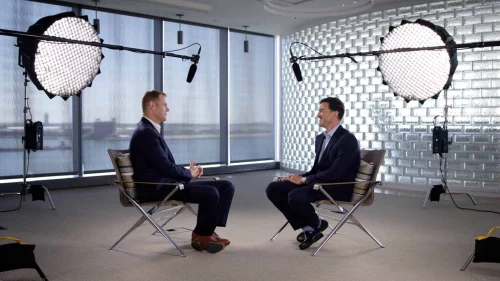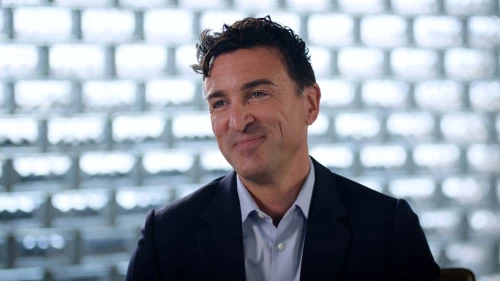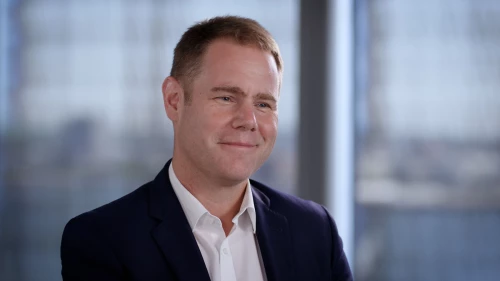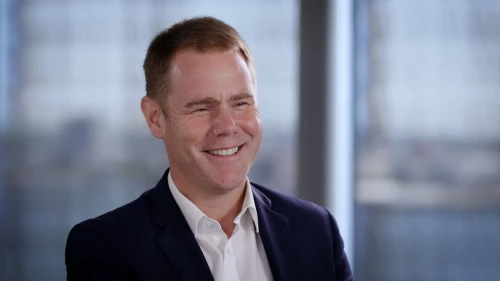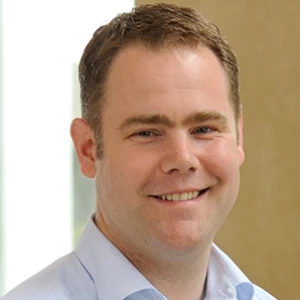Headquartered in Tokyo, Japan, with a global hub in Cambridge, Massachusetts, Takeda is a leading, values-based global biopharmaceutical company with a focus on discovering and delivering life-transforming treatments in core therapeutic and business areas, including gastrointestinal and inflammation, rare diseases, plasma-derived therapies, oncology, neuroscience, and vaccines. Chief Data and Technology Officer Gabriele Ricci sat down with BCG’s Torben Danger to discuss the company’s major digital transformation initiative and its impact across the value chain. The conversation also touched on the company’s new ethical AI framework, leadership during volatile times, and the importance of partnerships.
You’ve worked in leadership positions in numerous biopharma companies. How has that shaped your approach to leadership? What would be your top three pieces of advice for other chief digital officers in the current environment?
I started in a manufacturing facility and then I moved to headquarters. This helped me understand the complexity of a big pharma and how technology can help connect the different parts of an organization and create value.
I have three pieces of advice. First, be a functional leader, be committed to deliver value for the organization. Second, be a people leader and think about how the workforce will evolve over time. Third, be a digital leader. Embrace a mindset that is focused on the customer and long-term value generation.
We need a new generation of leaders that can help our organization to be future-ready. They need to be bold, courageous, and fearless. They need to take measured risks, challenge the status quo, and reimagine the boundaries of what is possible in these turbulent times. They should consider challenges an opportunity to drive innovation and value creation.
You’re leading a large digital transformation. What do you think are the most critical success factors?
We set a very bold ambition: to become one of the most trusted science-driven digital biopharmaceutical companies. In my view, four factors are critical to success. First, commitment from the leadership: communicating clear strategy and the implications of the change for the organization. Second, reimagining the organization in the long term: determining the skills and capabilities that need to be built. Third, value creation: resolving to create value with the resources from across the whole organization. Fourth, helping the organization in the change: understanding why and how to change and bringing everybody along with you.
Did the transformation require any changes to the operating model?
When we started designing the organization that would drive the transformation, we realized that 80% of the digital workforce was external. If you have a bold ambition, like being a three-star Michelin chef, you don’t outsource your kitchen. This is very similar to a digital journey. So we determined the capabilities we needed. That required massive insourcing, so we created innovation capability centers: our digital factories. Like the manufacturing facilities where we produce amazing therapies for our patients, we are building digital factories where we produce data and digital solutions to create value across the organization.
Takeda is investing heavily in digital data analytics. How do you make the tradeoff decisions between digital and data and other areas, and how do you manage innovation investment overall?
We are injecting data and digital into every aspect of our business. When we embed data and digital into every business unit, we empower the president of every business unit to decide whether to invest more or less in the digital transformation, making tradeoffs with other parts of the business. My role is to connect the dots and take the best ideas and the best opportunities and scale across the value chain.
The big shift for the organization was to think about how to deliver value with a minimal investment. This concept of MVP (minimum valuable product) and how you are committed to scale the value across the organization with further releases—that changed completely how we prioritize investment in the organization.
Subscribe to our Health Care Industry E-Alert.
In your view, what are Takeda’s biggest digital opportunities in R&D, the patient experience, and the supply chain?
Development is a critical digital opportunity. For the first time, we have six assets in Phase 3. But recruiting patients for clinical trial is challenging. So we are re-imagining the patient experience, how we can use the centralized trials and technologies, like wearables, for example, or telemedicine to reduce the frictions for our patients to join our trials.
We have made great progress with our supply chain, which is completely AI driven . The network has been optimized to bring therapies to our patients as fast as possible. At the same time, it’s generating efficiency through sensors. And we just introduced drones that fly around our warehouses calculating inventory in real time.
What are you most excited about when it comes to AI and GenAI?
We’ve creating an ethical AI framework to ensure that we create the environment in which we can experiment while managing risks. I think we are still the only pharma company with a digital trust officer. This role is helping us understand how to apply ethical components across the entire life cycle of building and maintaining data and digital solutions, and how exposing the potential bias of our algorithms will create more transparent and auditable systems and, therefore, equitable outcomes. We are training all these algorithms with data that we don’t own, so we have the responsibility to manage it properly and avoid unintended consequences.
What is the biggest challenge regarding Takeda’s digital transformation and how do you overcome it?
Changing the culture. Japan has more than 3,000 companies that, like Takeda, are more than 200 years old. They have certain characteristics in common: customer obsession, creation of long-term value, and agility and resiliency. Creating agility in the organization so that it’s focused on the customer and value creation—that’s the goal. It’s a long journey because we want this to be relevant for the roughly 50,000 people across the organization.
What does Takeda look for in partnerships?
This is not a journey that we can do alone. Partnerships require mutual commitment to the success of the two companies with common goals, delivering value with the same value framework.
Every time we make a joint decision, we think about how this decision will impact patients, the trust of the community that we serve, the reputation of our brand, and ultimately, whether the decision is economically sustainable. We share this value framework with our partners because this is the way we can create value together. We are exploring partnerships across the entire organization.
We continue to evolve. We say that our organization is always in MVP mode, constantly changing because the business is changing. We need to be cognizant about where to set the compass, and be agile enough to react to the signals that we get.

